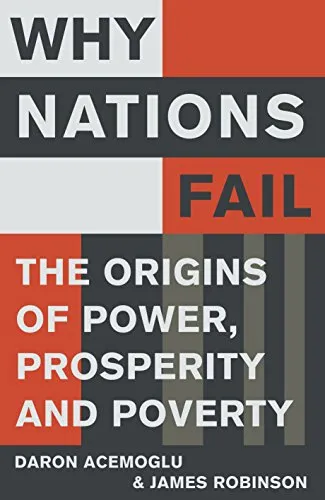Why Nations Fail: The Origins of Power, Prosperity, and Poverty (PowerPoint Presentation Delivered for Morishima Lecture, LSE June 8, 2011)
4.5
بر اساس نظر کاربران

شما میتونید سوالاتتون در باره کتاب رو از هوش مصنوعیش بعد از ورود بپرسید
هر دانلود یا پرسش از هوش مصنوعی 2 امتیاز لازم دارد، برای بدست آوردن امتیاز رایگان، به صفحه ی راهنمای امتیازات سر بزنید و یک سری کار ارزشمند انجام بدینکتاب های مرتبط:
معرفی کتاب
کتاب "چرا ملتها شکست میخورند: ریشههای قدرت، ثروت و فقر" به نویسندگی جیمز رابینسون و دارون عجماوغلو یکی از برجستهترین آثار در زمینه اقتصاد سیاسی است که به بررسی علل و عوامل موفقیت یا شکست ملتها میپردازد.
خلاصهای از کتاب
این کتاب به دنبال پاسخ به یک سوال ساده اما عمیق است: چرا برخی ملتها ثروتمند و برخی فقیر هستند؟ نویسندگان با استفاده از شواهد تاریخی و تجربی متعدد نشان میدهند که نهادهای اقتصادی و سیاسی یک کشور نقش اساسی در تعیین سرنوشت آن کشور ایفا میکنند.
رابینسون و عجماوغلو نهادها را به دو دسته "فراگیر" (Inclusive) و "انحصاری" (Extractive) تقسیم میکنند. نهادهای فراگیر، آنهایی هستند که فرصتهای اقتصادی را برای بخش وسیعی از جامعه فراهم میآورند و به حقوق شهروندان احترام میگذارند. اما در مقابل، نهادهای انحصاری به نفع گروهی خاص عمل کرده و مانع دسترسی آزادانه سایر افراد جامعه به منابع و فرصتهای اقتصادی میشوند.
نکات کلیدی
- نهادهای فراگیر پایههای توسعه پایدار را فراهم میکنند.
- نهادهای انحصاری به تمرکز قدرت و ثروت در دست عدهای محدود منجر میشوند.
- تغییر نهادها ممکن است دشوار باشد اما غیرممکن نیست.
- نقش رهبری و آگاهی عمومی در ابداع نهادهای فراگیر بسیار مهم است.
نقلقولهای معروف از کتاب
"تفاوت بین ملتهای ثروتمند و فقیر، در نحوۀ توزیع قدرت و فرصتها نهفته است."
"بیثباتی و ناحقوقی از ویژگیهای نهادهای انحصاری است."
چرا این کتاب مهم است؟
این کتاب به دلایل مختلفی اهمیت دارد. اولاً، دیدگاه نهادین اقتصادی و سیاسی را به روشنی تبیین میکند و نقش اساسی آنها در تعیین سرنوشت ملتها را نشان میدهد. دوماً، با ارائه شواهد تاریخی و مطالعات مقایسهای بر روی کشورها، تصویر روشنی از فرایندهای تاریخی ایجاد و تغییر نهادها ارائه میدهد که میتواند به سیاستگذاران و محققان درک بهتری از چگونگی دستیابی به توسعه پایدار بدهد.
این کتاب به خصوص برای افرادی که به دنبال درک عمیقتری از علل بنیادی نابرابری جهانی هستند، بسیار مفید است و میتواند به عنوان راهنمایی برای اصلاحات نهادین در کشورهای مختلف مورد استفاده قرار گیرد.
'Why Nations Fail: The Origins of Power, Prosperity, and Poverty' offers a compelling analysis of the factors that contribute to the success or failure of nations. Authored by economists Daron Acemoglu and James Robinson, this book delves into the enigmatic question of why some countries achieve economic prosperity while others languish in poverty. Presented as a PowerPoint for Morishima Lecture at the LSE, the book dissects the historical, political, and economic dynamics that shape the paths of nations.
Detailed Summary of the Book
Acemoglu and Robinson argue against orthodox economic theories that emphasize geography, culture, or ignorance as primary causes for economic disparity. Instead, they introduce the concept of institutional structures as central drivers of national success. The authors categorize these into two types: inclusive and extractive institutions. Inclusive institutions encourage participation, innovation, and economic activity by providing a level playing field for all. This ensures that the majorities have access to education, technology, and political power, fostering sustainable development. On the other hand, extractive institutions concentrate power and opportunities in the hands of a few, often leading to stagnation and degeneration.
Through a historical lens, the book examines numerous case studies to illustrate these concepts. The authors explore why several countries in Latin America remain mired in poverty while North America has thrived. Their detailed analysis spans centuries and continents, as it weaves together the stories of empires, revolutions, and pivotal economic changes, illuminating how the institutional legacy of colonialism, revolutions, and reforms affects the current prosperity of nations.
Key Takeaways
- Inclusive political and economic institutions foster sustained economic growth and prosperity.
- Extractive institutions, where power is concentrated and the majority is excluded, lead to stagnation and poverty.
- Historical events and critical junctures can lead nations onto different paths of development.
- Understanding a country's political dynamics and historical context is crucial in addressing its economic challenges.
- Efforts to reform institutions must focus on making them more inclusive to ensure long-term prosperity.
Famous Quotes from the Book
“Nations fail today because their extractive economic institutions do not create the incentives needed for people to save, invest, and innovate.”
“Economic institutions shape economic incentives: the incentives to become educated, to save and invest, to innovate and adopt new technologies.”
“Inclusive economic institutions require secure property rights and economic opportunities not just for the elite but for a broad cross-section of society.”
Why This Book Matters
'Why Nations Fail' is a monumental work that reshapes our understanding of economic and political development. It provides a robust framework to analyze the root causes of wealth and poverty in countries worldwide. Its insights are not only theoretically groundbreaking but also critically applicable to policymakers, economists, and leaders aiming to pave a path toward sustainable development and prosperity. In a globalized world that is increasingly interconnected, understanding the underpinnings of economic success or failure is essential for tackling the pressing issues of inequality and underdevelopment. The book's focus on institutions shifts the conversation from deterministic theories to an adaptable and actionable understanding of development.
دانلود رایگان مستقیم
شما میتونید سوالاتتون در باره کتاب رو از هوش مصنوعیش بعد از ورود بپرسید
دسترسی به کتابها از طریق پلتفرمهای قانونی و کتابخانههای عمومی نه تنها از حقوق نویسندگان و ناشران حمایت میکند، بلکه به پایداری فرهنگ کتابخوانی نیز کمک میرساند. پیش از دانلود، لحظهای به بررسی این گزینهها فکر کنید.
این کتاب رو در پلتفرم های دیگه ببینید
WorldCat به شما کمک میکنه تا کتاب ها رو در کتابخانه های سراسر دنیا پیدا کنید
امتیازها، نظرات تخصصی و صحبت ها درباره کتاب را در Goodreads ببینید
کتابهای کمیاب یا دست دوم را در AbeBooks پیدا کنید و بخرید
1507
بازدید4.5
امتیاز0
نظر98%
رضایتنظرات:
4.5
بر اساس 0 نظر کاربران
Questions & Answers
Ask questions about this book or help others by answering
No questions yet. Be the first to ask!








